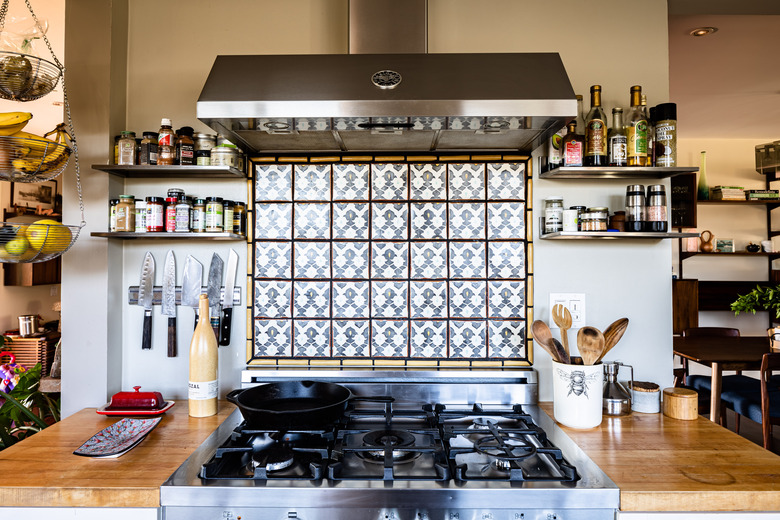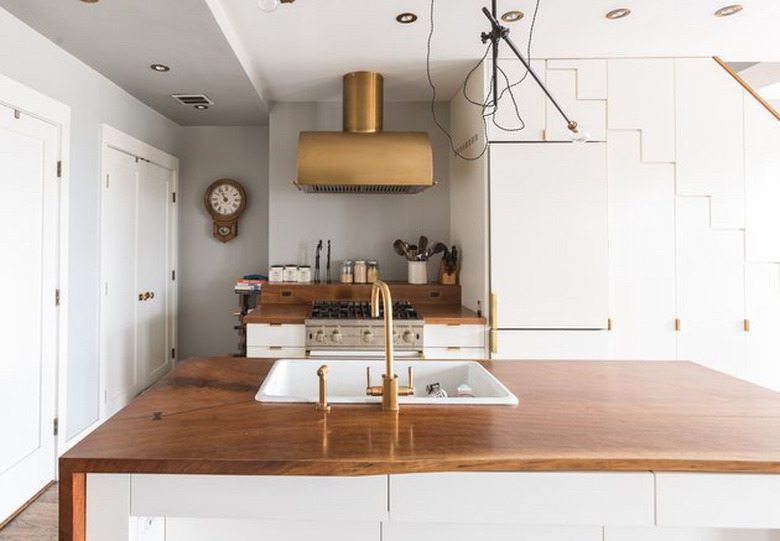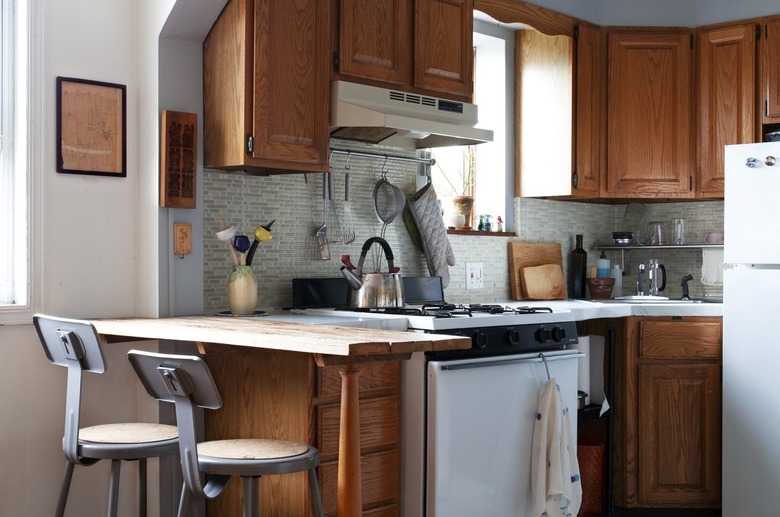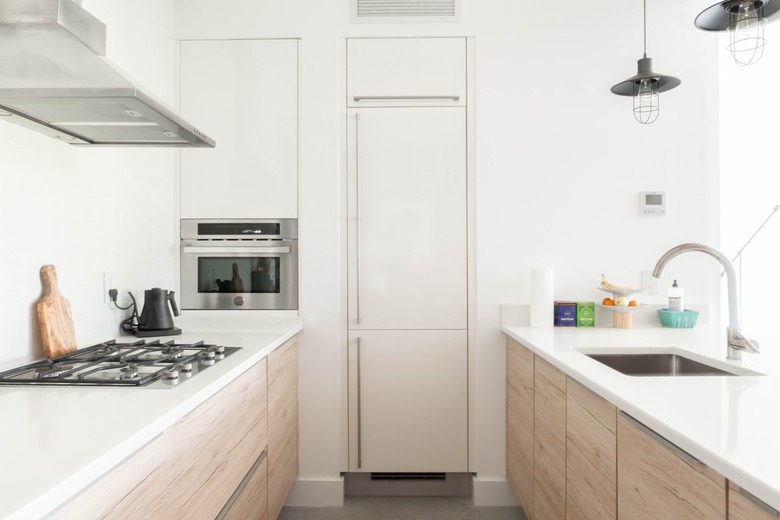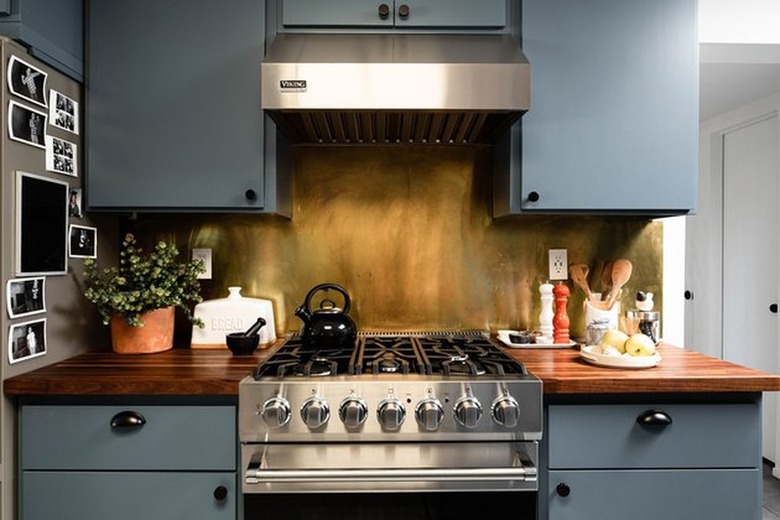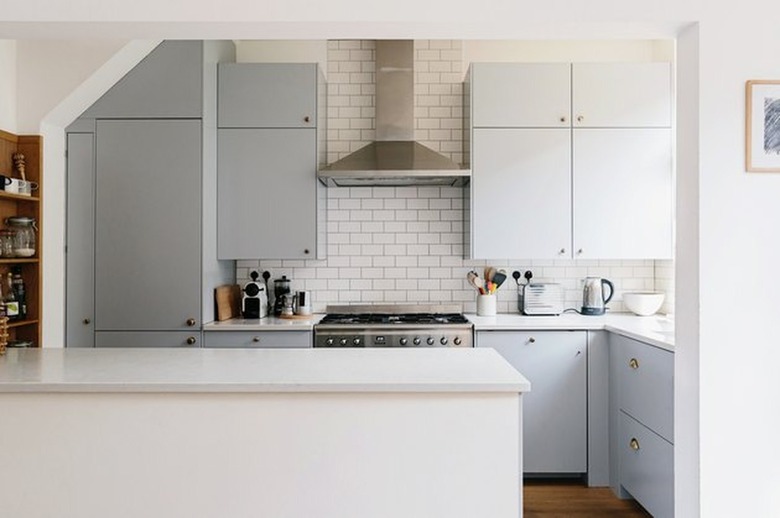Ducted Vs. Ductless Range Hoods: Which Is Right For You?
We may receive a commission on purchases made from links.
When it comes to choosing the right type of vent hood for your kitchen range, there are generally two exhaust hood options: ducted and ductless. While both use fans to help cut back on smoke and fine particles that get into the airflow, each type of kitchen hood comes with its own set of pros and cons. The key factors in choosing one over the other will come down to the type of home you have, how much you cook, and your budget. For apartment or condo dwellers, oftentimes your choices tend to be a bit more limited. But fear not — we're going to take you through everything you should consider when picking out either a ducted or non-ducted exhaust fan hood for your cooking area. You'll understand what works best for your home in no time.
Ducted Hoods
Ducted Hoods
As the name implies, a ducted cabinet range hood uses ducts to create a ventilation system in the kitchen and help with recirculation. This addition draws fumes from above the stove and sends them through mesh or carbon filters so they can vent outside. It's considered more "built-in" or permanent than its counterpart. Additionally, ducted hoods tend to be more expensive. Prices range from about $400 to $2,000, and you will most likely spend more money on the installation of a wall mount range hood. Here are some pros and cons to consider before buying.
Ducted Hood Pros:
- Ducted hoods with mesh filters are better at removing cooking odors and heat from your kitchen.
- Ducted hoods tend to be quieter because the exhaust fan is farther away from the stove.
- Thanks to powerful fan speeds, a ducted hood can remove any moisture that comes from the cooktop.
- Ducted hoods are often incredibly stylish and can make a major statement above any kind of stove.
Ducted Hood Cons:
- This type of recirculating, vented option can only be installed in a home where ducts already exist or there is room to install new ones.
- There may be spatial limitations because, ideally, this feature should be located near an exterior wall. This means ducted island range hoods aren't always recommended. Moreover, venting into a place like an attic could cause heat, moisture, or even mold issues down the road.
- Trickier installation means you will most likely have to hire a contractor to install a ducted hood.
- The cost of installation could be $300 to $600 in addition to the price of the hood.
- Ducted hoods are generally more expensive than ductless hoods.
Ductless Range Hoods
Ductless Range Hoods
A ductless range hood is just that — one that doesn't require ductwork for kitchen ventilation. Although a ducted system is more effective overall for improving air quality, it's not an option for every space. If, for example, you live in a condo, townhouse, or apartment, making major property modifications or installing ducts throughout the walls or ceiling may not be possible.
The layout of your food prep zone may also make a ducted range hood cost prohibitive, in which case a ductless variety is a good alternative. The price range for this kind of kitchen hood is anywhere from $100 upwards to $1,000, but many stylish ones can be found on the cheaper end of the spectrum.
Ductless Hood Pros:
- Ductless hoods are usually more affordable. You can find some models for less than $100.
- They work in any kitchen, and some plug-in models can be easily installed without professional help.
- Ductless hoods have one or more charcoal filters that remove odors and fine particles from the air. A fan draws these remnants into the unit and recirculates them back into the kitchen.
- You can buy microwaves with ductless hoods that can be installed above the stove in a smaller kitchen.
Ductless Hood Cons:
- The noise level for ductless hood fans tends to be higher (though that doesn't affect functionality). If you can, test out the fan at a retailer before purchasing.
- The filters need to be cleaned out or replaced regularly and can cost $10 to $20.
- Ductless hoods don't get rid of strong smells, humidity, or hot air as easily as ducted hoods which means you might need to find other ways to ventilate while cooking.
Hard-Wired or Plug-In Options
Hard-Wired or Plug-In Options
Since both ducted and ductless range hoods have fans (and usually LED lights as well), they require electricity. Check the product information thoroughly before purchase to determine whether the hood is designed to be hard-wired or if it plugs into a nearby outlet. This is especially important if you plan to install the hood yourself.
If you hire a contractor, be sure to mention in advance if the hood requires an electrical connection. If there are cabinets or appliances in the way, installation can be tricky.
How much will it cost to install?
How much will it cost to install?
You'll definitely want to do your research before creating a budget and making a final selection. If you're in the market for a ducted hood and need to install ductwork, it can be pricey. Some top-of-the-line hoods cost upwards of $1,500 depending on the width and features like lights, fan modes, and filtration. Certain finishes, like brushed stainless steel, can also be pricey. Additionally, the labor often starts at around $200 an hour according to HomeAdvisor. So major jobs could cost around $1,000 depending on your kitchen layout.
Ductless hood installation is far cheaper, and you could potentially do the job yourself. But keep in mind, even these appliance prices can range broadly. Additionally, you still may need to hire an electrician to connect a ductless hood, so you're still looking at around $200 for electrical on top of the cost of the hood.
Which range hood is right for you?
Which range hood is right for you?
Before making your final decision, take these important things into consideration: your budget, your kitchen configuration, how much you use your range, and how much construction is necessary.
A ductless hood is easier to install, costs less, and doesn't require ductwork to function in your home. It will still give you some ventilation and work well in an apartment or condo. If you're not using your range multiple times a day, a ductless fan is definitely a viable option.
If you already have some ductwork in place or just need to update what's there, a ducted range hood is ultimately the best way to go. It will still cost more than its counterpart, but you'll get better ventilation especially if you cook frequently.
